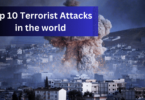This article recounts the top 10 terrible events in history, reminding us of the importance of learning from the past to build a better future.
Throughout human history, we have witnessed moments of great triumph and progress, but we have also endured periods of unimaginable tragedy and sorrow.
From natural disasters to man-made atrocities, certain events have left indelible scars on our collective memory.
Terrible Events in History
1. The Holocaust (1941-1945):

One of the darkest chapters in human history, the Holocaust was a systematic genocide orchestrated by the Nazis during World War II.
Six million Jews, along with millions of other minorities, including Romani people, disabled individuals, and political prisoners, were ruthlessly exterminated in concentration camps.
The atrocities committed during this period stand as a stark reminder of the consequences of unchecked hatred and bigotry.
2. The Great Famine in China (1959-1961):

Known as the “Great Leap Forward,” this disastrous policy in communist China led to a massive famine that claimed the lives of an estimated 15 to 45 million people.
Poor agricultural policies, forced collectivization, and the prioritization of steel production over food cultivation resulted in widespread starvation and suffering.
3. The Rwandan Genocide (1994):

In just 100 days, an estimated 800,000 Rwandans, primarily from the Tutsi ethnic group, were brutally murdered by extremist Hutus.
Fuelled by long-standing ethnic tensions and incited by propaganda, the genocide serves as a harrowing reminder of how intolerance and prejudice can escalate into unfathomable violence.
4. The Chernobyl Disaster (1986):

The Chernobyl nuclear power plant explosion in Ukraine released radioactive materials into the atmosphere, causing immediate deaths and long-term health consequences for thousands.
The disaster remains one of the worst nuclear accidents in history and exposed the dangers of nuclear energy without adequate safety measures.
5. The Indian Ocean Tsunami (2004):

Triggered by a massive undersea earthquake off the coast of Sumatra, the Indian Ocean tsunami unleashed waves that devastated coastal communities in 14 countries.
The death toll surpassed 230,000, leaving countless families grieving and highlighting the need for improved early warning systems for natural disasters.
6. The Black Death (1347-1351):

One of the deadliest pandemics in human history, the Black Death, caused by the bacterium Yersinia pestis, swept through Europe, Asia, and Africa.
It is estimated to have killed between 75 and 200 million people, decimating entire communities and forever altering the course of history.
7. The Armenian Genocide (1915-1917):

During World War I, the Ottoman Empire carried out a systematic extermination of its Armenian minority population, resulting in the death of an estimated 1.5 million people.
The event remains a source of tension and denial between Turkey and Armenia to this day.
8. The Holocaust of Native Americans (15th to 19th centuries):

The colonization of the Americas by European powers led to the widespread displacement, forced assimilation, and deliberate extermination of indigenous peoples.
Millions of Native Americans lost their lives due to diseases brought by European settlers and violent conflicts, marking a dark period of history stained by injustice.
9. The Hiroshima and Nagasaki Atomic Bombings (1945):

In the final days of World War II, the United States dropped atomic bombs on the Japanese cities of Hiroshima and Nagasaki.
The bombings killed an estimated 200,000 people, most of them civilians, and raised significant ethical questions about the use of nuclear weapons in warfare.
10. The Atlantic Slave Trade (15th to 19th centuries):

The transatlantic slave trade involved the capture, transportation, and enslavement of millions of Africans, who endured unimaginable suffering, brutality, and dehumanization.
The legacy of this tragic period continues to impact societies worldwide, underscoring the importance of addressing systemic racism and promoting equality.
While these events represent some of the darkest moments in history, they serve as powerful reminders of humanity’s capacity for cruelty and injustice.
Remembering and understanding these tragedies is crucial to prevent their repetition and build a more compassionate and tolerant world.
By acknowledging the mistakes of the past, we can strive to create a future defined by peace, empathy, and mutual respect.








